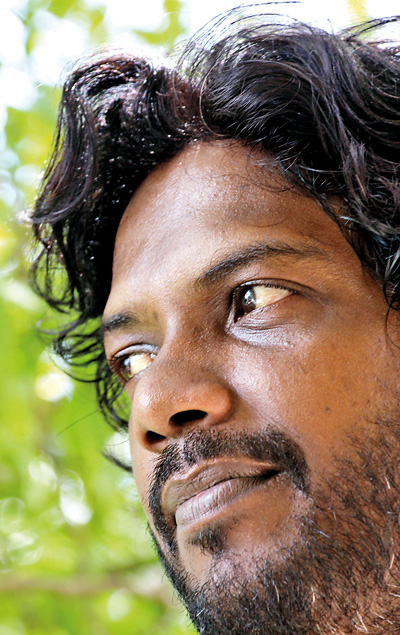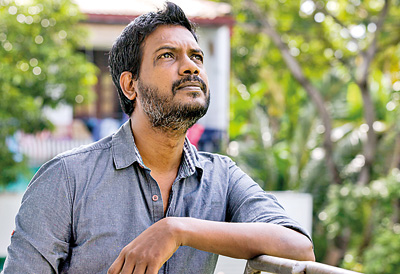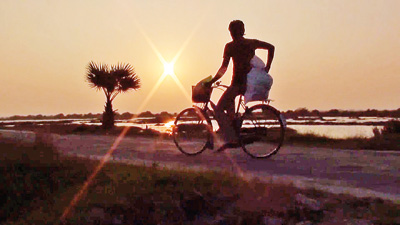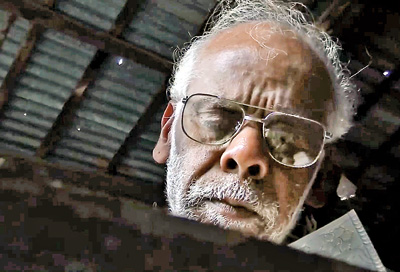Going global with Cinema
Young video editor, director and producer, Nandana Sitinamaluwa, on a day in 2008 received a call from an unknown number. The caller was a girl, from Chavakachcheri in Jaffna. It was during the height of the war between Tamil rebels, the LTTE and the Sri Lankan military. The caller was trying to reach her brother but had accidently dialled Nandana. Though the conversation ended as any other mistaken call, later the two started talking to each other and the girl shared the struggle the Northern people were facing at that time. A bottle of kerosene was priced at Rs 300, much higher than the price in the South and even paracetamol Rs 70 a tablet, nearly hundred times higher than the price in the South.

Film editor, director and producer Nandana Sitinamaluwa
Nandana was comparing the major contrast in two different locations in the same country. The two were posting letters with details of the two different settings. Sometimes the letters that came from the North were opened but young Nandana, the son of an army officer did not understand the situation. The war ended in 2009 and Nandana decided that he should go to the North and visually capture what his friend was going through. The girl was willing to help this ‘film production’, one of the first post-war films shot in the North and she played many roles as a coordinator, researcher, helper and even as an actress. Thus Nandana made his maiden documentary- ‘Shadows of a Wind’.
Born and bred in Galle, Nandana having completed his Advanced Level examination in Science stream was searching for his future career. At school he was the brass band leader and was able to play few musical instruments like the trumpet and the trombone. Having seen his musical talent one of his friends directed him to Bellwood Aesthetic Centre run by the National Youth Services Council. There Nandana did not continue music but by twist of circumstances, having seen a teledrama being shot there, decided his career would be a filmmaker.
Nandana decided to come to Colombo and study cinema by joining the OCIC film training course which laid the foundation for many veterans in the field and conducted by Sri Lankan Catholic Church. Following his training Nandana got an opportunity to work in a company making animations.
While working there he got an offer to work as an editor of ‘Bonsoir’ famous TV programme run by the French Embassy. “I got a chance to work for Bonsoir on freelance basis. It was just for one day a week but I was asked to join on full time basis. I worked for Bonsoir till 2008,” said Nandana who later took up a journey to India and stayed for several months travelling, working and filmmaking for some designing projects.
Almost a decade after the end of the war Nandana has realised war was not the way to solve a crisis. “We are in 2020 and we don’t have to fight with each other for anything. If somebody says I don’t want to stay in your house, I must let the person go. How long our life span is, may be around 60 years or little more. During this short life span what can we achieve by killing each other,” Nandna asked.
“My father himself was an army officer and he was not there at home when I needed him most as a child. But now I am in Colombo and my father is at home. We are still apart and this is just only a one loss due to war,”.
Nandana’s documentary in North, immediately after 26-year long war was screened at the Berlinale Film festival in India and it was selected for the first round under the documentary category. Recently he produced another interesting documentary ‘Malwatu Oya Soya’, a social, historical and cultural journey along one of the important waterways in Sri Lanka.
While in Colombo, Nandana got the best use of the opportunities and the door was opened for him to take part in film screenings and discussions conducted by the late Dr. Tissa Abeysekera who was the a director at the Sri Lanka Television Training Institute (SLTTI).
“Some days I took part in film screenings which went on for almost the entire day. There was massive amount of knowledge that Dr. Abeysekera shared about cinema, its history, politics and present. situation. Dr. Abeysekere organised film screenings on various subjects at the SLTTI and this helped me a lot to study cinema.
Once there was a festival about the French new wave and that was one of the inspirations that I got. I was watching French directors like Jean-Luc Godard, Alain Resnais and François Truffaut. Then there was Bergman’s film festival. Dr. Tissa was discussing about the films, their meaning and poetry. He was explaining how poetic cinema is. Dr. Abeysekera is one of the Gurus on cinema we had in Sri Lanka.
After almost 20 years, playing different roles in the field, Nandana’s next project is a feature-length film. “I have done a feature film script and it is an adaptation from ‘Man Standing Behind” and I have got the author’s copyright to make the movie. I am doing the second script on another story as well,” says Nandana with much hope.
“There is another story I am working on. It is actually a real incident which happened at a Buddhist temple in the Southern province a few decades ago. Some Dutch painters came to Sri Lanka to do some paintings in a temple with the permission of the monk but the people were not happy about their final finished works and this led to a major incident there” Nandana outlined the story.
However the young filmmaker is well aware about the challenges of the future cinema specially in a country like
Sri Lanka.
“We can’t do films for the sake of art because it is an industry as well as a business. Filmmaking requires a lot of work and lot of money. Besides our audience is limited and we need a strategy. If you take some South Indian movies we find both artistic and commercial elements are blended. I can see that in some of the Western filmmakers like Emil Kusthirikas films. There are so many entertaining happenings like music, weddings and dramas but they are strong and deep stories. When we see these films we can read their communities and I like that genre,” he said.
I also like works of Quentin Tarantino. These films have played the same role that was played by the literatures in this world. They are not visually boring and they are really entertaining. We have to go for such options. If we do that there would be an international audience.
Alternatively Nandana thinks that the digital and online technology is going to play a major role in film screening.
“We have come to an era where people will go to the digital world and there will be video on demand. We have to find a way to get in there soon because our neighbours like India are already there. Our target should be the global audience. On the other hand we should be updated to understand and identify the trends for a global audience,” he says.
According to Nandana in future there will be a change in traditional filmmaking. “I have a set of friends who are in the field and companies that provide equipment. What I have been told is to start work on a film and they would provide the services and equipments and I will have to pay them once the film is sold. It is a good deal. We need only a producer who will pay for the on location expenses. If we can do that we can produce an international movie and approach Netflix or Amazon prime,”.
He says series like ‘Gangs of Wasseypur’ directed by Anurag Kashyap in India was sold online to Netflix several years after it was originally released. Following this came ‘Sacred Games’, then ‘Paatal Lok’, ‘Family Man’ and ‘Mirzapur’ bought by Amazon Prime. Subsequently there were a large number of films made in Kerala recently. They were not just commercial films. They are entertaining and artistic too.
“Recently I went to watch a film and there were only three patrons but there were six employees running the theatre. How can an industry survive in this situation? But if you go to cinemas like Colombo City Centre and PVR there are screenings of international films with a bigger audience”.
According to Nandana there are large numbers of budding filmmakers who are waiting with scripts in their hands. He is of the view that the institutions like the National Film Corporation should intervene to find support for these young filmmakers. In the business community there are businessmen who spend one million a day. But if that was given to five short film makers there will be at least five short films. We need projects like that.


A scene from ‘Shadows of a Wind’


